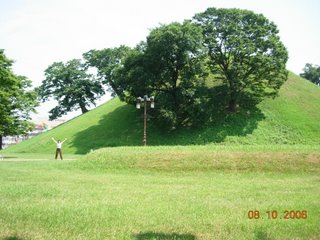Thursday, September 14, 2006

Gyeong-Ju
We spent our last three nights in Korea at a hostel run by a Mukashi-Nihonjin (old or ex- Japanese) in Gygongju. He had a small old voice, just like our Japanese teacher in Japan.
Gygongju was the ancient capital of the Silla empire, and today, it is a proud city. In its parks are huge burial mounds of Silla kings whose names have mostly been forgotten. The city is full of stinky fish markets and bustling streets with a seemingly unreasonable number of shops selling clothes. Just like in Japan, teh young people here wear silly English shirts that say things like "Return to Africa", "World Without Strangers", "Every Jack and Lucy Gill"....
Korea is hot. Scorching sun, high humidity, we drink lots of bottled water. There are more churches than temples, and they all look the same. At night they all have a big glowing red cross high in the sky. The downtown streets are lit with neon at night, but are surprisingly silent. The countryside here is more like Europe's than Japan's -- wide valleys with only glowing green rice fields, and no houses. In Japan, I never saw flat land that wasn't dotted with houses. Only plastic greenhouses and long plastic umbrellas covering the rows of vineyards reminded me of Japan. Some towns here consist almost entirely of highrise apartments. A few vertical neighborhoods and then countryside, fields and forest again. The Koreans seem to have the same love of building bridges over towns and fields as teh Japanese. Korean forests are less managed. Crooked, nobbly pines are most common--not the good straight lumber-forests of Japan.
Korea has visible problems. Poverty, beggars with damaged limbs who crawl through subway cars, who yell at people who don't give, who display their injuries, who wait in the sun for pocket change. They don't hide it in Korea. People fight, have arguements in the street. We saw an old man shove an old lady as she shouted at him and threw cardboard at him. Farmers sit on the sidewalk or on pieces of styrofoam and sell wilting vegetables and bruised fruit. They sell them for almost nothing. Perhaps Japan would be less shy and superficial if it were poorer. I wonder what it was like when it was poor, if I would recognize the culture the Japanese grandparents grew up in.
On the trains and subways, people will come on to sell things. On this train, a man walks through the train chanting like a monk and carrying bags of dried squid, and now he's changed to selling something else. On the subways in Pusan, one man sold a vegetable slicer and covered his face with thin slices of cucumber during his well-rehearsed skit. He even sold a few for $5 each. Another salesman, who didn't sell anything while we watched, sold mats that were foil on one side and tatami on the other. He folded them and unfolded them, giving reasons we didn't understand why we should buy them.
In Korea, there are only 250 last names.